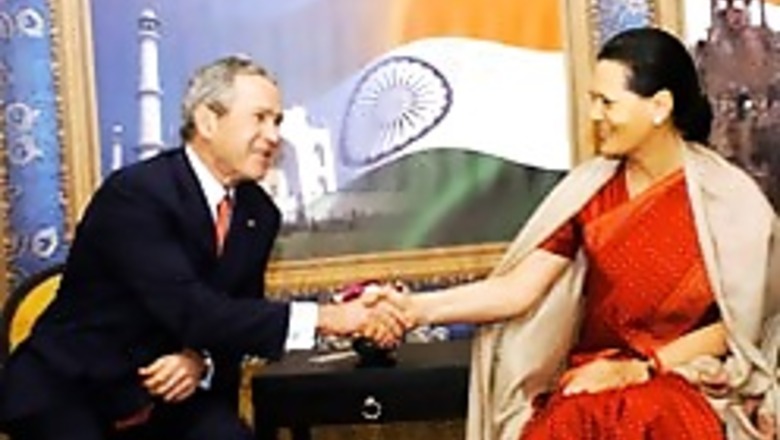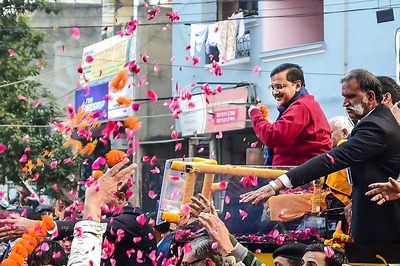
views
New Delhi/Washington: March 2, 2006 will go down in the history books as a golden day for Indo-US ties.
The civilian nuclear deal finalised between the two democracies has drawn India out of its nuclear isolation of more than 30 years.
Under the deal, New Delhi will now approach the International Atomic Energy Agency (IAEA) for working out 'India-specific' safeguards.
New Delhi will now open 14 of its 22 nuclear reactors to international safeguards and the US has promised permanent supply of uranium.
"It really is a historic deal. Indo-US ties had taken great strides. However, the boulder in the living room was the civilan nuclear deal. And that boulder has been cleared and it will see a huge surge in momentum in Indo-US relations," Former US Ambassador to India, Robert Blackwill, said.
But the agreement is only the first step. India now turns its sights towards President Bush who still has to get a stamp of approval from the US Congress.
"Congress should debate and it will debate, but I think the deal will pass in end," Blackwill opined.
However, the anti-deal lobby in both countries is only getting stronger and going by the large scale loud protests in India and the cynical response from US, it won’t be an easy task for George Bush to convince the Congress.
"The agreement that President Bush announced today is a historic disaster for the non-proliferation regime of the world," Rep. Edward Markey (D) of Massachusetts, said.
However, there’s also some muted support from the American quarters. Former India Caucus chairs Joe Crowley and Joe Wilson released a joint statement on Tuesday saying the deal will strengthen global non-proliferation efforts and the strategic partnership between the two countries.
But the statement also warns India that the Congress will not approve the deal unless New Delhi actually begins the separation of its civilian and military facilities.
Bush however expressed confidence that Capitol Hill will support the agreement.
"Congress has got to understand that it is in our own interest that India have civilian nuclear power industry to help take the pressure of the global domain for energy," he said.
Back in India, Prime minister Manmohan Singh too has a tough task ahead. Convincing the Left parties is going to be no easy task. The Left allies have already rubbished the deal and have taken their anti-Bush, anti-deal campaign to streets.
PAGE_BREAK
In a nutshell, the deal means the following:
- All India civilian and nuclear plants will now be put under permanent international safeguards
- India's all future civilian - thermal and breeder reactors - too will be put under permanent international safeguards
- In return, US assures India of uninterrupted supply of nuclear fuel
- US will also help India achieve a multi-lateral regime to ensure uninterrupted supply of nuclear fuel
- There will be a council of advisers who will arbitrate in case of any disruptions
- The world market will be accesible to India for nuclear fuel once it joins the loop
- India won't be allowed to trade in military part of nuclear sphere
(Which means US has not recognised India as a nuclear state. It's just a de facto recognition.)
- India will be free to continue its nuclear programme - be it development of new reactors of military programme
- India has prepared a plan that demarcates 65 per cent of Indias nuclear facilities as 'civilian'
- At least 14 of India's 22 reactors will now come under international scanner
- All these facilities will be open to inspections by the IAEA
(This is a major concession since all of India's nuclear facilities have been closely guarded and no external inspection has been allowed for decades. For over three decades India has been kept out of the international trade in nuclear technology and nuclear fuel.)
- The deal will end India's nuclear isolation
- India will be able to source uranium from the international market.
(This is extremely imporrtant for india's nuclear peogramme since uranium is a cheaper fuel)
- This means costs of uranium will go down.
- Deal will open the door to nuclear power suppliers from Russia and France to set up plants in India
- The nuclear plants will be operated under safeguards
- These countries will take back the spent fuel
(In other words India will be able to more effectively use nuclear technology for power generation and replace costlier conventional sources.)
- It will also mean that India can get international nuclear technology for its reactors
(With inputs from Prerna Kumar)


















Comments
0 comment